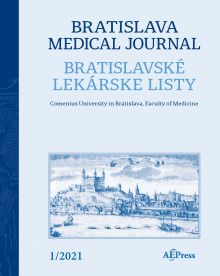Journal info
|
||||
Select Journal
Journals
Bratislava Medical Journal 2024 2023 2022 2021 2020 2019 2018 2017 2016 2015 2014 2013 2012 Ekologia - Ecology Endocrine Regulations General Physiology and Biophysics Neoplasma Acta Virologica Studia Psychologica Cardiology Letters Psychológia a patopsych. dieťaťa Kovove Materialy-Metallic Materials Slovenská hudba 2025Webshop Cart
Your Cart is currently empty.
Info: Your browser does not accept cookies. To put products into your cart and purchase them you need to enable cookies.
Bratislava Medical Journal Vol.125, No.8, p.508–512, 2024 |
||
| Title: Vitamin D in blood serum and chronic pancreatitis | ||
| Author: Marie PRECECHTELOVA, Petr DITE, Dana BUCKOVA, Martina BOJKOVA, Bohuslav KIANICKA, David SOLIL, Jiri DOLINA | ||
| Abstract: Patients with chronic pancreatitis are at risk of developing malabsorption and malnutrition. Exocrine pancreatic insufficiency is accompanied by decreased serum micronutrient levels and low vitamin D levels are a frequent finding in up to 60–80% of patients. The aim of our prospective study was to investigate vitamin D in the blood serum of subjects with chronic pancreatitis with the possibility of influencing the reduced vitamin D levels with supplementation therapy. MATERIAL AND METHODOLOGY: Fifty patients with chronic pancreatitis and 20 subjects in the control group without gastrointestinal tract diseases, including pancreatic disease, were examined. The vitamin D level in blood serum was determined. The results were evaluated according to the age distribution of subjects with pancreatic disease and according to gender. Patients with low vitamin D levels were treated for 24 weeks with a dose of 1.500.000 IU of vitamin D3 per day, and then blood serum vitamin D levels were determined. RESULTS: In people with chronic pancreatitis, vitamin D levels were statistically significantly reduced compared to the control group. There was no statistically significant relationship of vitamin D with gender and age. Supplementation with vitamin D3 achieved an adjustment of vitamin D level to the level of the control group. CONCLUSION: Blood serum vitamin D levels are significantly reduced in people with chronic pancreatitis. Its correction by oral vitamin D supplementation was effective. Whether this adjustment of levels will be effective also in terms of e.g. beneficial effect on fibrogenesis will require further representative studies, because the limitation of the interpretation of the results of our study is the smaller number of subjects with chronic pancreatitis (Tab. 4, Ref. 29). |
||
| Keywords: chronic pancreatitis, exocrine pancreatic insufficiency, pancreatic fibrosis, vitamin D, vitamin D supplementation | ||
| Published online: 17-Jun-2024 | ||
| Year: 2024, Volume: 125, Issue: 8 | Page From: 508, Page To: 512 | |
| doi:10.4149/BLL_2024_79 |
||
|
|
 download file download file |
|

